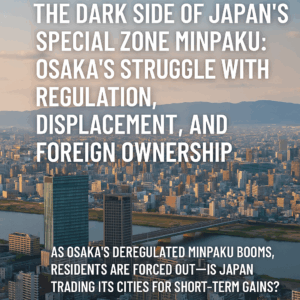
As Osaka’s Deregulated Minpaku Booms, Residents Are Forced Out—Is Japan Trading Its Cities for Short-Term Gains?
Introduction
Japan’s post-COVID tourism recovery has been dramatic. With a record 36.87 million foreign visitors in 2024 and a national goal of 60 million by 2030, the demand for lodging has skyrocketed. To meet that demand, Japan introduced Special Zone Minpaku—a deregulated short-term rental scheme allowed only in government-designated areas.
But as the number of these properties explodes—particularly in Osaka, where over 90% of Special Zone Minpaku facilities are concentrated—so do the complaints, legal concerns, and social frictions. What began as a creative hospitality solution is now raising urgent questions about housing stability, governance, and even immigration abuse.
